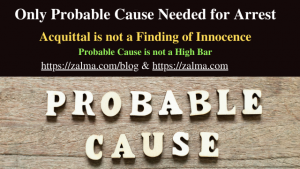Only Probable Cause Needed for Arrest

See the full video at https://rumble.com/v28sqfi-only-probable-cause-needed-for-arrest.html and at https://youtu.be/wNvFY-rHv8I
Probable Cause is not a High Bar
People who attempt insurance fraud are always upset when the fraud fails. When that failure results in an arrest and trial, the upset grows. When the jury acquits the fraudster it is never enough to give thanks there is no need to go to jail, the fraudster wants – to paraphrase Shakespere – a pound of flesh from those who stopped the attempt.
In Joseph Fehl v. Borough Of Wallington; et al, No. 21-3019, United States Court of Appeals, Third Circuit (January 25, 2023) Joseph Fehl sued the Borough of Wallington; Witold Baginski, the Borough’s former business administrator; and Sean Kudlacik, a captain in the Borough’s police department, alleging civil rights violations. Finding no material facts in dispute, the District Court granted the Defendants’ motions for summary judgment.
FACTS
Fehl served as a volunteer EMT and firefighter for the Borough of Wallington. He filed for worker’s compensation, claiming he was “hit by [a] car” during an emergency response. Kudlacik conducted an investigation that raised questions about Fehl’s story, as it found no physical evidence, no indication of serious injury, and no vehicle matching the description Fehl provided. Nor did video from the scene show any vehicles in the area where the accident allegedly occurred. As a result, Fehl was indicted for criminal insurance fraud and tampering with public records. Following trial, a jury acquitted him of those charges.
Based on the acquittal, Fehl sued asserting several claims arising from his arrest and prosecution. The District Court granted the Defendants’ motions for summary judgment, concluding their acts were supported by probable cause.
PROBABLE CAUSE
Fehl argued that a reasonable jury could have concluded Kudlacik lacked probable cause to investigate his employment claim. However, probable cause exists when there is a “fair probability” that the person to be arrested committed the crime. Police officers are not required to correctly resolve conflicting evidence and their determinations of credibility need not, in retrospect, be accurate. For those reasons, probable cause is not a high bar.
Drawing all reasonable inferences in Fehl’s favor, the Third Circuit could see no error in the District Court’s analysis. The facts known to Kudlacik at the time of Fehl’s arrest provided a sufficient basis to doubt Fehl’s credibility and to believe he committed the charged crimes.
Consider Fehl’s statement in his benefits application that he was struck by a car, with the absence of any corroborating physical evidence. Or consider Fehl’s claim that he suffered nerve damage from the accident-an injury that conflicts with the extent and type of physical harm a victim would typically suffer in a hit-and-run. Fehl also, after he was confronted, changed his story conceding that he might have merely tripped and fallen.
The finding of probable cause is not negated by the jury verdict. The mere fact that a defendant is later acquitted of the offense for which he is arrested is irrelevant to the validity of the arrest. Guilt in a criminal case must be proven beyond a reasonable doubt, a standard enforced by the rules of evidence. Probable cause imposes no such burden on the Government-rather, it demands that police officers find merely a “fair probability” that a crime was committed. That standard was satisfied at the time of Fehl’s arrest, and the jury’s verdict does not alter that finding.
CONSTITUTIONAL VIOLATIONS
Fehl contended that Baginski, as Borough administrator, infringed Fehl’s First and Fourteenth Amendment rights. Fehl alleged that Baginski concocted a scheme to force Fehl to submit his worker’s compensation claim, directed a third-party administrator not to pay the benefits, and conspired with Kudlacik to launch a police investigation. Even if true, these allegations cannot state a constitutional claim.
To state a First Amendment claim for retaliatory arrest or retaliatory prosecution, a plaintiff must plead and prove the lack of probable cause for the criminal charge. Fehl’s arrest and prosecution were, contrary to his claims, supported by probable cause.
Fehl needed to show that Baginski participated in, directed, or acquiesced to retaliation. Baginski affirmed he had no role in investigating, or directing any risk manager in the investigation of, any injury claims, including Fehl’s. Nor did Baginski direct Kudlacik or anyone else to arrest Fehl.
The facts established that there was clear probable cause to arrest Fehl, especially after he changed the claim that he was hit by a car to he tripped and fell, established a lack of veracity in the claim and an attempt to defraud the employer to obtain Workers’ Compensation fraud. His attempt at First Amendment and tort claims failed because there was sufficient probable cause to arrest and try Fehl for insurance fraud. That he was acquitted did not change the conclusion that there was probable cause for the arrest and trial.
(c) 2023 Barry Zalma & ClaimSchool, Inc.

Subscribe and receive videos limited to subscribers of Excellence in Claims Handling at locals.com https://zalmaoninsurance.locals.com/subscribe.
Go to substack at substack.com/refer/barryzalma Consider subscribing to my publications at substack at substack.com/refer/barryzalma
Barry Zalma, Esq., CFE, now limits his practice to service as an insurance consultant specializing in insurance coverage, insurance claims handling, insurance bad faith and insurance fraud almost equally for insurers and policyholders. He practiced law in California for more than 44 years as an insurance coverage and claims handling lawyer and more than 54 years in the insurance business. He is available at http://www.zalma.com and zalma@zalma.com
Write to Mr. Zalma at zalma@zalma.com; http://www.zalma.com; http://zalma.com/blog; daily articles are published at https://zalma.substack.com. Go to the podcast Zalma On Insurance at https://anchor.fm/barry-zalma; Follow Mr. Zalma on Twitter at https://twitter.com/bzalma; Go to Barry Zalma videos at Rumble.com at https://rumble.com/c/c-262921; Go to Barry Zalma on YouTube- https://www.youtube.com/channel/UCysiZklEtxZsSF9DfC0Expg; Go to the Insurance Claims Library – https://zalma.com/blog/insurance-claims-library
Like this:
Loading…
Related







